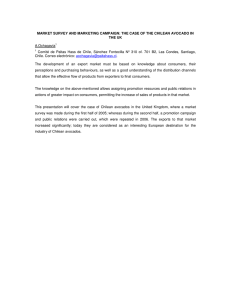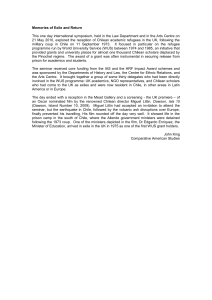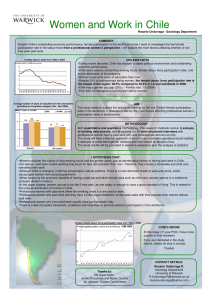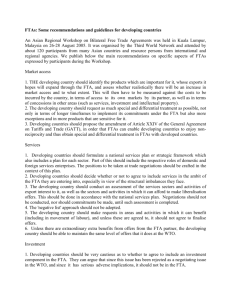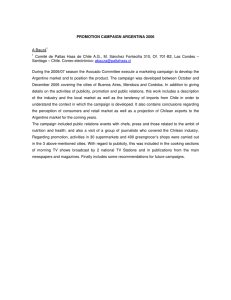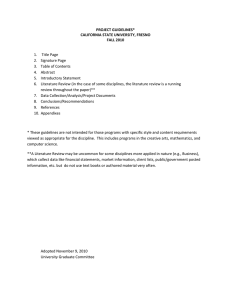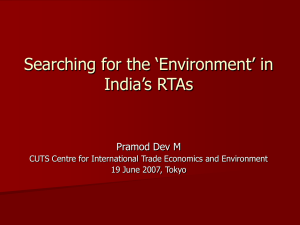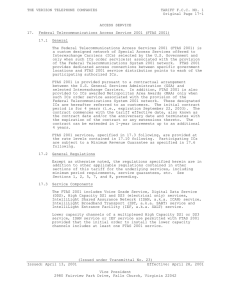Session IV Trade Policy Dialogue on the Multiple
advertisement
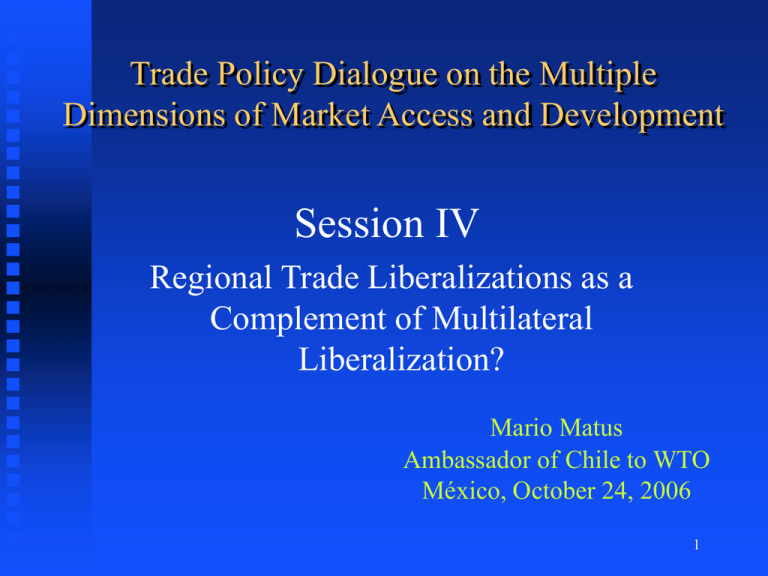
Trade Policy Dialogue on the Multiple Dimensions of Market Access and Development Session IV Regional Trade Liberalizations as a Complement of Multilateral Liberalization? Mario Matus Ambassador of Chile to WTO México, October 24, 2006 1 Presentation Why FTAs/RTAs? Chilean experience Looking for complementary to WTO? 2 FTAs/RTAs Scope for Regional Trade Arrangements: Limited Comprehensive Problems Exception to MFN Discrimination. Exclusion of other members. Trade deviation Complexity for business community Different level of negotiating leverage Do not address all issues (i.e. DS, Export Subs) Erosion of multilateral system if they do not go beyond & under WTO rules & principles 3 Why FTAs/RTAs Market access (goods) Easier to negotiate (bilateral fine tuning) Political reasons: International (i.e. US-Chile; US-Jordan, etc) Domestic (i.e. push for internal changes) To be paid for liberalization Not to be kept behind To minimize trade deviation (further negotiations) WTO slowness for honest free traders Real free trade (0% tariff) Develop more and stricter rules (i.e. TR, Compt, etc) Protection of foreign investment 4 Chilean reasons Foreign trade policy Open economy (free flows goods, S & I) Dependent on international trade (more trade) Small country (disciplines) Transparent/legalistic/non corrupted (disciplines) Certainty. Rules and disciplines Dispute settlement Reduce external economic vulnerability Attraction of FDI Differentiation in international economic context 5 What do we are looking for? Commercial Trade creation & reduction of trade diversion Elimination tariff peaks Promote exports Induce more competition Economic Rules and disciplines Reduce external economic vulnerability Attract FDI Political Dispute settlement Differentiation in context of international economic turbulence 6 Chile's bilateralism Comprehensive FTAs Limited Trade Agreements: Canada Mexico Central America (5) European Union (25) USA South Korea EFTA (4) Singapore New Zealand Brunei China Panama 1997 1999 2002 2003 2004 2004 2004 2005 2005 2005 2005 2006 Japan 2006 Mexico 1991 Venezuela 1993 Colombia 1994 Ecuador 1995 Mercosur (4) 1996 Peru 1998 India 2005 54 + 7 Chilean Trade I 90 80 % of growth 70 60 W Agreements 50 40 W/O Agreements 30 20 Total trade 10 0 94 95 96 97 98 99 Year 0 1 2 3 4 8 Chilean Trade II 250 200 % of growth 150 Mexico Canada 100 US UE Korea 50 0 1994 1995 1996 1997 1998 1999 Ye ar 2000 2001 2002 2003 2004 9 Chile : Merchandise Exports 40,6 40 Billion dollars 35 32,0 30 US$ 25 20 16,0 15,4 15 10 5 4,2 5,2 7,0 10,0 9,2 8,1 8,4 8,9 17,9 16,3 17,2 19,2 18,3 18,2 21,5 11,6 0 1986 1987 1988 1989 1990 1991 1992 1993 1994 1995 1996 1997 1998 1999 2000 2001 2002 2003 2004 2005 Years Source : Central Bank of Chile 10 Gross Domestic Product (1984 = 100) 400 350 331 300 250 218 200 150 174 125 109 117 104 100 138 143 186 234 250 258 256 282 267 276 293 311 197 155 100 50 0 1984 1985 1986 1987 1988 1989 1990 1991 1992 1993 1994 1995 1996 1997 1998 1999 2000 2001 2002 2003 2004 2005 Source : Central Bank of Chile Annual average GDP growth rate 84-05: 5.9 % 11 Growth, trade and poverty (1990-2000) 40 000 40 36 000 38 32 000 36 28 000 34 24 000 32 20 000 30 16 000 28 12 000 26 8 000 24 4 000 22 0 % de la población total miles de millones de Ch$ de 1996 Evolución del Producto, Intercambio Comercial y Pobreza 20 1990 1992 1994 Intercambio (X+M) 1996 años GDP 1998 2000 # of poors 12 Comprehensiveness Goods Institutional Tariffs (no exceptions) Transparency NTM (prohibition) Objectives, Customs (proced & standards) Rules of origin (simple) exceptions, final provisions, etc. DSM Disciplines Safeguards (Bilat-Global) TBT/SPS Competition / AD “Non trade issues” Intellectual Property Rights Labor Services (negative list) Investment (pre-post) Cooperation Temporary entry Political Environment commitments 13 Bilateralism vs Multilateralism Comprehensiveness All topics includes GATT Art. XXIV GATS Art V Enabling clause Minimum exceptions in MA (goods & services) Future work Common rules of origin Precision on Arts. XXIV & V Common definition of “going beyond WTO” Best practices in APEC, OECD? Develop model for FTAs/RTAs? 14 Spaghetti bowl 15
